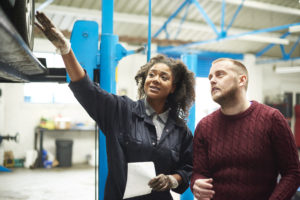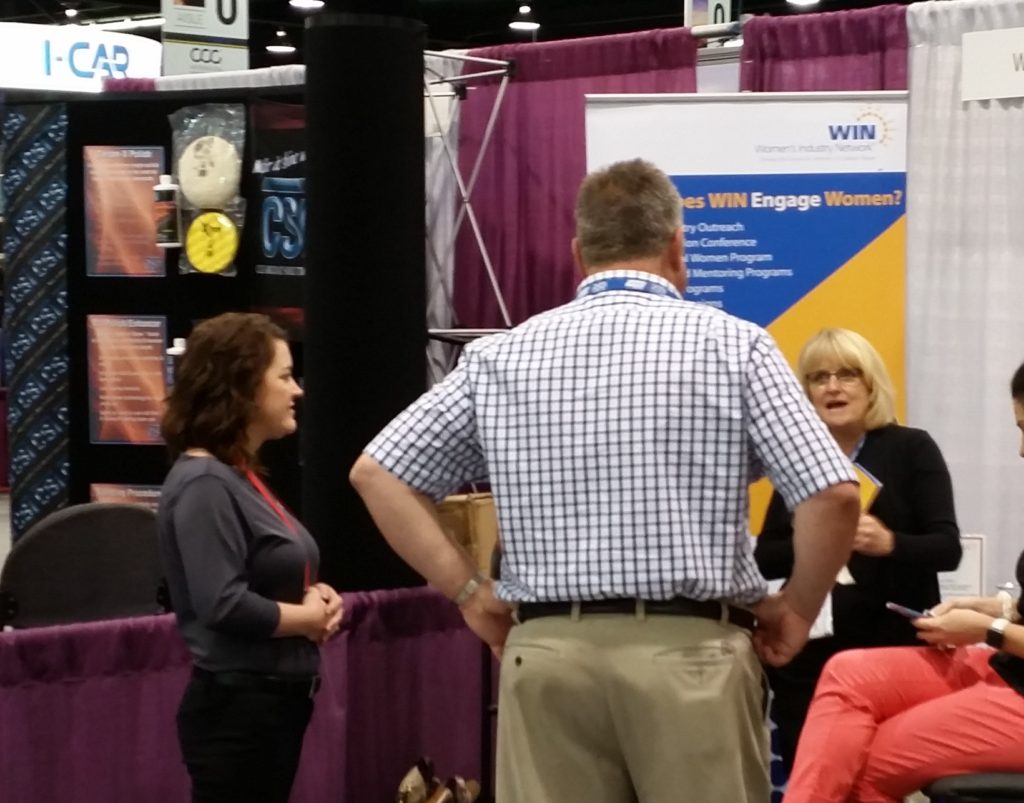
Women in automotive: WIN nominees due Dec. 31; AIA survey has lessons for workplaces
By onAnnouncements | Associations | Business Practices | Education
As we’ve noted before, encouraging women to consider the male-dominated field of collision repair is a logical way to alleviate tech shortages and perhaps better cater to half — if not more — of one’s potential customers.
“This is not a women’s issue, this is an industry issue,” Automotive Industries Association industry relations Senior Director France Daviault said at the 2016 Women’s Leadership Conference in Canada, according to the AIA.
There’s some things one can do to get the ball rolling, including one time-sensitive step:
Nominate for WIN awards by Dec. 31
First, don’t forget to nominate someone for the Women’s Industry Network’s Most Influential Women Awards before it’s too late. Nominations opened Nov. 1, and the deadline is Saturday, Dec. 31.
Nominations are open to any woman working in any aspect of the collision repair ecosystem in the U.S. and Canada; past winners’ represented such industries as body shops, paint jobbers, insurers, information providers and trade groups.
“The award recognizes women for their leadership in four areas: industry influence; professional accomplishments; mentoring and support for others in the collision repair industry; and for going beyond the requirements of their professional lives to give back to their communities,” WIN wrote in a news release.
Neither nominees nor nominators are required to be WIN members, and men can submit nominations as well.
“It doesn’t take a woman to nominate a woman,” Washington Metropolitan Auto Body Association Executive Director Jordan Hendler, a 2014 award winner, told a Collision Industry Conference crowd last month.
Company and industry culture
U.S. and Canadian collision repairers might also find more female applicants by keeping in mind insights from a Canadian study released earlier this year by the AIA.
The research included a survey, though researchers caution the data isn’t reliably representative because of its low response rate. It also involved what researchers indicated might have been the most fruitful element: a series of 1.5-hour focus groups that overall heard from 40 women “with various years of experience and occupations in the aftermarket, providing for a rich discussion with those in the front line, support staff and leadership roles.”
Overall, the study, released by the AIA but partly funded by a Canadian government initiative and actually conducted by St. Clair College, had four main suggestions. They’re presented here with minor formatting edits:
- Employers create more inclusive workplace cultures free of inappropriate “pinups” and commentary, where male and female colleagues are accorded equal respect and advancement opportunities.
- Employers implement pro-active support measures for women employees, including formal mentoring programs and access to industry networking opportunities.
- The industry invest in measures that enhance public awareness of employment opportunities for women, partnering with educational institutions and featuring them in recruitment campaigns.
- Governments continue to support training and incentive programs and communication campaigns aimed at increasing women’s participation in skilled trades and the industry.
The insightful and candid comments from real women working in the automotive industry show what this actually would look like in the real world. It’s a fascinating and at times, shocking, humanization of the issue and education on how to help the industry these women have chosen:
Here’s a few of the comments and summaries that caught our eye and reinforced the study’s points. Find the complete study and even more thought-provoking quotes here.

How not to behave:
- “My husband and I own a shop; we have clients and distributors that come in for business. They’ll come in, and they will direct everything at my husband – everything is directed to the man.”
- “I have an 18-year-old daughter working in the industry and I encouraged her to become an auto mechanic. She took high school courses and she was looking for an apprenticeship. She went into a store to apply for a job and the store manager blatantly told her that it wouldn’t be a good idea to have her in the back because she would be a distraction.”
Work-life balance:
- “A small number of participants mentioned that the unattainability of work/life balance had a significant impact on their experiences, particularly as it related to career advancement. Women from different focus groups spoke of the challenges they experienced in attempting to balance their careers and family life. They attributed the problem not to men, but to the fact that the industry is male-dominated and therefore most companies don’t have workplace practices that respect the unique caregiver roles that many women fulfill, thus placing them at a competitive disadvantage in career advancement.”
See the workplace from the other gender’s perspective:
- “I was not comfortable with the items [pin-ups] posted in the room, so I went to talk to the manager and 5 minutes later he was in the room taking down the pictures and talking to the guys, telling them it was not appropriate. He could have easily just said ‘get a tough skin, it’s just a joke’, but he didn’t and he responded very appropriately.”
- “I remember this course called ‘Sensitivity Training’ that we had to take. It was for people in our corporate office, and was mainly designed for the ‘old guard’, because part of their issue was that they were not ‘self-aware’ that some of the things they were saying and doing (that were once tolerated) were now inappropriate. So they were signed up, and told to take this training, and I remember one of the guys I took this course with marched out of the training and said ‘I’m so sorry if I have ever offended you and I had no idea if I was being offensive’.”
Networking:
- “Golf is really prevalent in this industry… I golf sometimes, and I don’t think I’m terrible, but I’m definitely not on the same wavelength as a male. I know that, and I’m okay with that, but it is again, extremely intimidating to golf. I felt like I was sweating, I knew the guys were judging me. There was a lot of pressure behind that.”
- “Networking, more than anything else, was the reason behind my career development… I never felt that they [the employer] were interviewing me as a woman, but that they were interested in me because I had the right skills and personality for the position.”
- “In addition, some focus group participants noted that the likelihood of being invited to such industry events was also rare. In most cases, the few women included were already in leadership roles; the more junior employees who would most benefit from opportunities to increase their profile and connections were typically not invited.”
Encouragement externally, internally:
- “Many of the focus group participants identified the importance of having mentors, both female and male, though none had any knowledge of available programs or opportunities.”
- “People need more knowledge about the industry. Even in high school I did not know there were opportunities and now I can see there are so many ways women can grow in the industry. It is important that we raise awareness about the opportunities in automotive because it is still a male dominated industry. We should have presentations in high schools and community colleges to help get the word out there.”
- “Several of the focus group participants identified how important it is for young women to see female role models working in the industry. For example, featuring images of women when promoting employment opportunities was seen as an effective strategy to encourage women to apply.
More information:
Most Influential Women nomination and award information
Women’s Industry Network, 2016
“Advancing Women in Automotive Knowledge Exchange Needs Assessment Report”
Automotive Industries Association, March 2016
AIA, June 23, 2016
Images:
Encouraging women to consider the male-dominated field of collision repair is a logical way to alleviate tech shortages. (sturti/iStock)
The Women’s Industry Network booth at NACE 2016. (John Huetter/Repairer Driven News)
